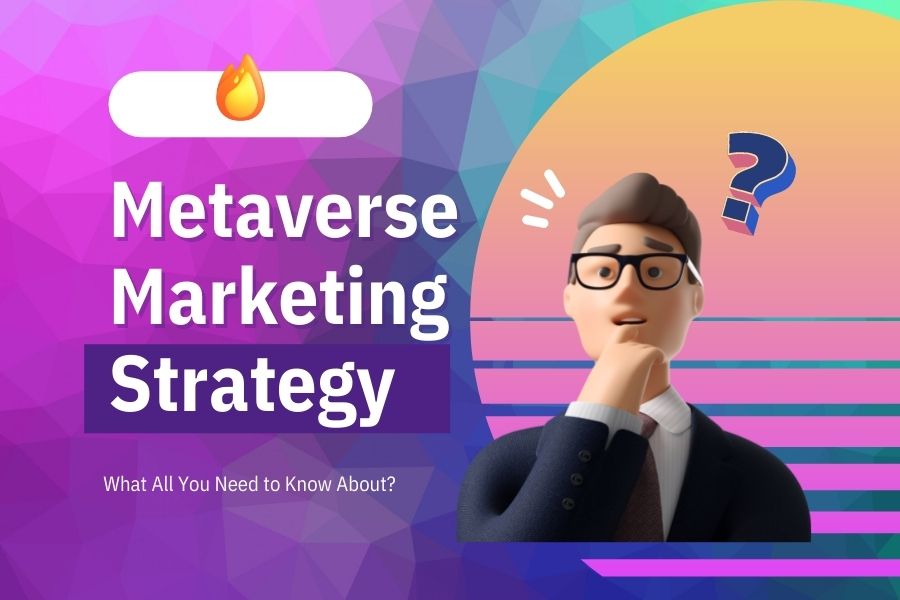Metaverse Marketing Strategy: What All You Need to Know About?


Metaverse Marketing Strategy What All You Need to Know About?
Technology is advancing at a rapid pace, and what comes next is here to stay. Yes, we’re referring to the METAVERSE! Social media has already succeeded in creating an online environment in which people can interact with both friends and strangers. Metaverse marketing strategy is simply taking it to the next level. And this is where metaverse marketing comes into play.
Metaverse is a technological trend that has the potential to alter our perception of marketing once more. That is the primary goal of this article. We’ll discuss what metaverse marketing is and how brands can benefit from it.
This beginner’s guide to metaverse marketing aims to provide a glimpse into the future.
Table of Contents
Metaverse Marketing: Understanding the Basics
Today’s metaverse consists of a shared virtual space in which users are represented by virtual avatars. Based on user decisions and interactions within the space, these virtual worlds continue to evolve and grow. To that end, it is similar to the real world in that it has no “end.” It’s just a universe that keeps growing as more people join in.
“A metaverse is essentially a network that allows you to interact in a 3D virtual experience. It’s a fictitious universe that uses personal computers and augmented reality headsets. You can create virtual avatars of yourself to experience life in a virtual world.”
It’s not just a simple virtual theme park with a centrally planned design, nor is it just a simple game designed solely for the enjoyment of children. It’s also not a simple app that you can download from the app store and “play” whenever you want. Metaverses are virtual universes that combine the real and virtual worlds.
The Facts & Figures About Metaverse Marketing
Let’s look at quick facts that highlight the craze that the metaverse has managed to create.
- The global market capitalization of metaverse companies is estimated to be around $14.8 trillion.
- Approximately 74% of adults in the United States have joined or are considering joining the metaverse.
- Travis Scott’s Fortnite virtual concert drew 45.8 million viewers in 2020.
- On the metaverse gaming platform Roblox, a digital Gucci bag was sold for $4115. This was more expensive than the retail price of a genuine Gucci bag, which is $3400.
- People can own, buy, and sell land in the virtual world through a platform called Earth 2.0.
- ‘Everyday: the First 5000 Days,’ an NFT, was sold for $69.3 million, making it the most expensive NFT ever sold to a single owner.
- By 2024, the VR market now expects to generate $12.19 billion in revenue.
What So Special About Metaverse Marketing?
There are several reasons why metaverse marketing can be profitable for brands:
- The first is the novelty element. Because the metaverse is such a novel concept, marketing and advertising in the metaverse can provide brands with a first-mover advantage. Furthermore, the costs of running campaigns in the metaverse are still significantly lower than traditional methods.
- The second major reason is that marketing in the metaverse allows brands to reach out to millennials and Generation Z audiences. Brands will be able to target this massive user base, which will only grow in the future.
- The third most important reason is that it provides innovative ways for brands to plan their marketing campaigns. You can market yourself in novel ways. Marketing in the metaverse will alter people’s perceptions of marketing. For example, the two most popular metaverses today, Fortnite and Roblox, allow brands to advertise their products in ways that were not previously possible.
Why Should You Promote Your Business in the Metaverse?
Consumer behavior has changed as a result of the digital age. More people are shopping, working, playing, and learning online, thanks in part to the coronavirus pandemic. The metaverse promises a solution that is “phygital” (physical and digital). It aims to blur the distinction between physical and virtual reality and alter how we perceive the world.
For businesses, this presents an opportunity to reach new audiences, boost consumer confidence, and investigate a new revenue stream. For example, Roblox has 200 million active users who spent $319 million on in-game currency in the second quarter of 2020. Surprisingly, 67 percent of the online gaming platform’s demographic is under the age of 16.
With Gen Zs dominating the metaverse, we can’t emphasize their importance as consumers enough. They have $143 billion in spending power in the United States, and experts predict that it will surpass that of millennials and boomers by 2030.
Overall, the metaverse is brimming with business opportunities. Top brands have dabbled in it, and you should, too. These best metaverse marketing strategies can provide you with some useful information.
The Metaverse Marketing Strategies That Can Work in Your Favor
Success in metaverse marketing, like success in digital marketing, is all about understanding the environment and figuring out what works best there.
Here are some pointers that can take your business in the right direction:
-
Accept Native Advertising Options
You can advertise just as easily in the metaverse as you can in the digital spaces you’re already familiar with. However, it is critical to do so in a way that does not disrupt the consumer’s current experience.
An ad that is creatively integrated into a larger environment, on the other hand, can add to a consumer’s enjoyment and give their experience a greater sense of realism. One example of native advertising is a virtual billboard strategically placed within popular games. Branded installations and special events can be effective as well.
-
Look for Ways to Replicate What You’re Already Doing Well
Don’t think of metaverse marketing as something that requires you to abandon your current strategy entirely. It’s more of a way to build on it than anything else. That being said, begin your journey into the metaverse by adapting your existing strategies to the new environment. Is your company committed to environmental stewardship? Create a metaverse event or promotion that corresponds to your real-world practices. Is there a collectability aspect to your catalog in real life?
Try offering limited edition metaverse items that will resonate with your target audience in the same way. These strategies are an excellent way to expose your brand to new audiences while maintaining your distinct brand identity.
-
Create a Dedicated Virtual Location
The metaverse offers enormous potential for creating appealing virtual spaces in which your customers will enjoy spending time. As in real life, your space can become a popular hangout or shopping destination for existing and potential customers. The virtual nature of the metaverse, on the other hand, gives you plenty of room to let your creativity run wild.
Virtual shops, museums, and even destination-inspired locations such as islands are all excellent choices. You can hold sales, tours, and events, among other things. To maximize user engagement and experience, make them as interactive as possible. Collaborate with popular AR or VR platforms and experienced designers to take the guesswork out of making your space everything you want it to be.
-
Create Epic Immersive Experiences for your Target Audience
Many of the same strategies that help businesses build their brands in traditional physical spaces also work in the metaverse. Immersive experiences are especially appealing because they can transport an audience outside of themselves and instill positive feelings about a brand. They can also aid in the promotion of long-term brand loyalty. Although the sky is the limit in terms of the type of experience you can provide, many brands and entities are already seeing tremendous success with options such as the following:
- Live concert performances that make use of the metaverse’s creativity.
- Dedicated games and puzzles that are engagingly designed around your brand.
- Extensive storytelling events in which the audience is invited to participate in the outcome.
-
Don’t Be Afraid to Experiment
You’re not alone if you’ve ever wished you could go back in time and establish your business online during the early days of the internet. You might also consider the introduction of the metaverse to be a second chance at a similar opportunity.
Marketers are living in an exciting time, and innovation is the key to capitalizing on it. The field is still wide open at this point. Best practices for succeeding in the metaverse have yet to be established, and the future still belongs to those willing to experiment and forge new paths. So don’t be afraid to follow your creative instincts and create something truly one-of-a-kind.
The Challenges Related to Metaverse Marketing
The metaverse promises a bright future for brands, but there are some obstacles to overcome along the way.
For one thing, while metaverses are becoming more popular, they still need more traction. Accessibility is a problem for metaverses due to their technological requirements. Not everyone has access to the devices required to experience the metaverse, such as high-end computers and VR lenses. This significantly reduces the potential market for brands and impedes mass marketing efforts.
Brands must also exercise caution when navigating metaverses. To avoid alienating players from the brand, seamless integration is critical. Because the technology is still in its early stages, brands may struggle to find their proper place in the metaverse and may come across as overly blunt in their messaging. Plan your placements carefully and ensure that they feel natural and integrated into the metaverse.
There are still a lot of misconceptions about metaverses. People frequently regard them as simple children’s games. Because not everyone understands the value of metaverses, many brands usually overlook their efforts to establish a presence on these platforms.
In the metaverse, data privacy and security remain a challenge. As technology advances, so does the need for more sophisticated security measures. This necessitates the development of new methods of data privacy and protection where none previously existed. Personal verification, for example, may necessitate more data from users, thereby increasing data privacy risks.
Finally, metaverses promise a bright future for computing and the internet. Furthermore, they provide plenty of room for marketers and advertisers to innovate. Despite these obstacles, the opportunity to be experimental, immersive, and innovative triumphs.
So, Is Your Brand Now Metaverse Ready?
For brands, marketers, and advertisers looking for new ways to market, the Metaverse offers a bright future. More importantly, it allows for plenty of room for experimentation and innovation.
Despite the challenges, metaverse marketing is an exciting opportunity to provide immersive experiences in ways never before possible. Is your brand, however, prepared for what lies ahead?
Remember to be creative and experimental as you consider the best way to interact with the metaverse. When it comes to the metaverse, the sky’s the limit.






